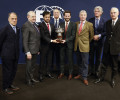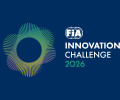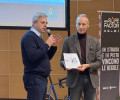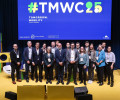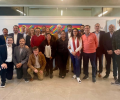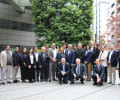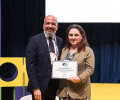FIA SMART CITIES eFORUM — ASIA-PACIFIC: RESILIENCE AND ADAPTATION TO A NEW MOBILITY NORMAL
Held on 23 September, the FIA Smart Cities eForum - Asia-Pacific gathered thought leaders from international organisations to discuss how cities are adapting to the new mobility normal created by COVID-19.

FIA President Jean Todt welcomed the eForum participants highlighting that the pandemic offers the chance to build a new reality for mobility: “While the current situation poses major challenges, there are significant opportunities to improve urban mobility. New solutions are required to enhance the resilience of transport services and infrastructure to keep economies running and communities connected without compromising public health.”
FIA Secretary General for Automobile Mobility and Tourism Andrew McKellar and Formula E Holdings CEO Jamie Reigle then gave the eForum’s opening remarks shedding light upon the new approaches needed to address this new mobility normal.
McKellar first insisted on the FIA Mobility Clubs’ ability to adapt quickly to this unprecedented situation: “This is a challenging time for our Clubs. But so many of them have actually been able to refocus rapidly their business plans and operations, to manage cash flow, to keep services going, and to maintain communication with their members. The FIA is responding to this with new programmes such as ‘Mobility Worldwide’, which are targeting at supporting our Clubs in the initial response to the economic impact of the COVID-19 crisis but also looking towards the medium term to ensure we have a more sustainable platform for them to operate on.”
McKellar then moved on to the second pillar of the FIA, Sport, mentioning the innovative character of the ABB FIA Formula E Championship, giving the floor to Jamie Reigle.
“The Championship was conceived with the purpose of accelerating electric vehicle adoption, addressing the reality of climate change, demonstrating the potential of urban mobility and the future of urban living. We were unusual as a sport in the sense that most sports exist because the games are interesting. Formula E, of course, is a race. It’s a very serious sport but it also has this purpose around addressing climate change and that vision is very much at the core of our product. We use the power of sport to inspire and to tell stories, and climate change is the most important story of our time.”
During the keynote session, Deloitte Director of Future of Mobility Solution Centre Andrey Berdichevskiy presented the work initiated by Deloitte in 2015 on the future of mobility, highlighting the tectonic shift from individual transportation to systemic optimisation. “This changes the nature of the business for our clients, not only in the automotive industry but also in the infrastructure, and other sectors such as entertainment, media, insurance and government services.”
Berdichevskiy also mentioned the work done in collaboration with the World Economic Forum around the ‘seamless integrated mobility system’ initiative. After consulting with a variety of cities around the world, they found out that all cities have a unique approach as to how they develop their mobility ecosystem. However, there are some common findings such as cities’ need for leadership and the key role played by the political sphere, the need for a clear and long-term vision, the importance of governance and regulation of innovations, as well as the need for partnerships and funding.
Berdichevskiy then presented four potential scenarios for transportation for the next three to five years, depending on the duration and severity of the pandemic, as well as the government’s response.

The eForum continued with a panel discussion gathering Head of ABB’s Global Business for E-mobility Infrastructure Solutions Frank Mühlon, UNESCAP Economic Affairs Officer Madan Regmi, Royal Automobile Club of Western Australia General Manager, Public Policy and Mobility Anne Still and Frost & Sullivan Industry Principal, New Mobility Shwetha Surender to look at “Innovation in Urban Mobility in a COVID-19 World”.
Adapting transport systems and mobility offers to respond to rapidly evolving user concerns has been a key challenge for mobility stakeholders and operators over the last months. Frank Mühlon from ABB recalled that the COVID-19 pandemic heightened environmental awareness and global demand for sustainable transport and that, in this context, electric vehicles and infrastructure can play a crucial role in driving change and innovation. “The transport sector has been heavily hit but there was actually no decline in the sales of battery electric vehicles. On the opposite, people thought about what will be the right means of transportation going forward.” Mühlon mentioned the positive impact of the different stimulus packages of governments on electric vehicles’ adoption and explained that more and more users are embracing electric mobility as both a sustainable and satisfying transport solution. As a result, the need for more E-mobility infrastructure is growing and Mühlon explained that ABB is now expanding its E-mobility portfolio with hardware and software developments in order to bring innovation to the heart of cities.
In addition to more sustainable modes of transport, over the past years, the demand for new mobility services had been a crucial trend in the Asia-Pacific market. COVID-19 and the resulting constraints on movement have had a rapid and far-reaching impact on this sector with shared mobility operators in particular being forced to reposition themselves. “What they had to do was maybe to realign what their services offering could potentially be. In some cases, we expect this to be a very short-term proposition, in some other cases, this is probably going to emerge as a long-term market restructuring, even establishing new standards for the mobility market”, said Shwetha Surender from Frost and Sullivan.
However, if services are evolving towards greater diversification and flexibility to better respond to shifting customer needs, the demand for shared mobility is expected to continue to grow. “Our expectation is that while the market has been impacted, growth rates have slowed, we’re already starting to see recovery coming through pockets and this is likely to be more sustained as we approach next year. By 2021, we do expect utilisation rates to go back to pre-COVID levels, if not, expand further. And what we do expect is that, by 2030, the overall opportunity around shared mobility is going to reach about 2 to 2.5 trillion USD”, Surender explained.
The outbreak of COVID-19 and health concerns also had an important impact on the roll-out of autonomous vehicles with increased demand for autonomous mobility solutions for delivery during lockdowns. This new technology, which is expected to drastically change the mobility landscape, is well-known by FIA Member Club the Royal Automobile Club of Western Australia, which, last week, relaunched Intellibus, its autonomous shuttle trial. Started in 2016, the objectives of the trial are to learn about autonomous technologies, recruit government partners on the pathway to readiness, give the community a chance to use an autonomous vehicle, and ultimately, help advance the technology and improve road safety.
With more than 16,000 people having participated and more than 25,000 driverless vehicle kilometres travelled, Anne Still from RACWA highlighted that the trial has been a big success for the Club. “The response from the community has been fantastic. About 96% of people who have ridden have said that they can see that technology working in the future and they think it’s been a positive experience to ride on it”, she said. Talking about future developments, she made a parallel between autonomous vehicles and the still unknown long-term impact COVID-19 will have on mobility patterns and habits. “With COVID, we don’t know what the legacy will be yet and I think that’s very much true for automated vehicles as well. They will probably reshape our cities but a lot of that still needs to be worked out, and a lot of that is relying on the stage the technology is at. So hopefully we can continue to test and learn, and as time goes on, global trials will resume, and technical assistance can begin flying around the world again — which is a challenge that we’ve experienced — so that’s very positive.”
All panellists agreed on the fact that, as the pandemic continues, guaranteeing safe transport of goods and people is crucial to ensure economic recovery and support communities. Talking about public transport and shared mobility, Madan Regmi from UNESCAP said, “The real important thing is to build back the confidence of users so that they can go back to using these systems.” To do so, in addition to innovation, an emphasis on cleaning, safety and more rigorous maintenance regimes is needed and UNESCAP is working to help its members adapt to this new reality, “Our main advice to cities and countries on how they can build better in the aftermath of COVID has been to preserve the health and well-being of the commuters and then to restore the supply chain, activity and mobility as well.” Regmi explained that we need to adopt a holistic approach, rethink city planning to integrate new mobility concepts and systems, favour digitalisation whenever relevant and possible, and facilitate freight transport and delivery of goods.
The last part of the eForum gave the floor to Aurassure, winner of the Asian edition of the FIA Smart Cities Global Start-up Contest Season 4, to present their IoT-enabled intelligent air quality monitoring system, collecting and analysing environmental factors through real-time data.
The FIA Smart Cities eForum – Asia-Pacific was the second conference of Season 4 of the initiative. The last eForum, with a regional focus on the Americas, will take place on 12 November.


 Facebook
Facebook Twitter
Twitter
